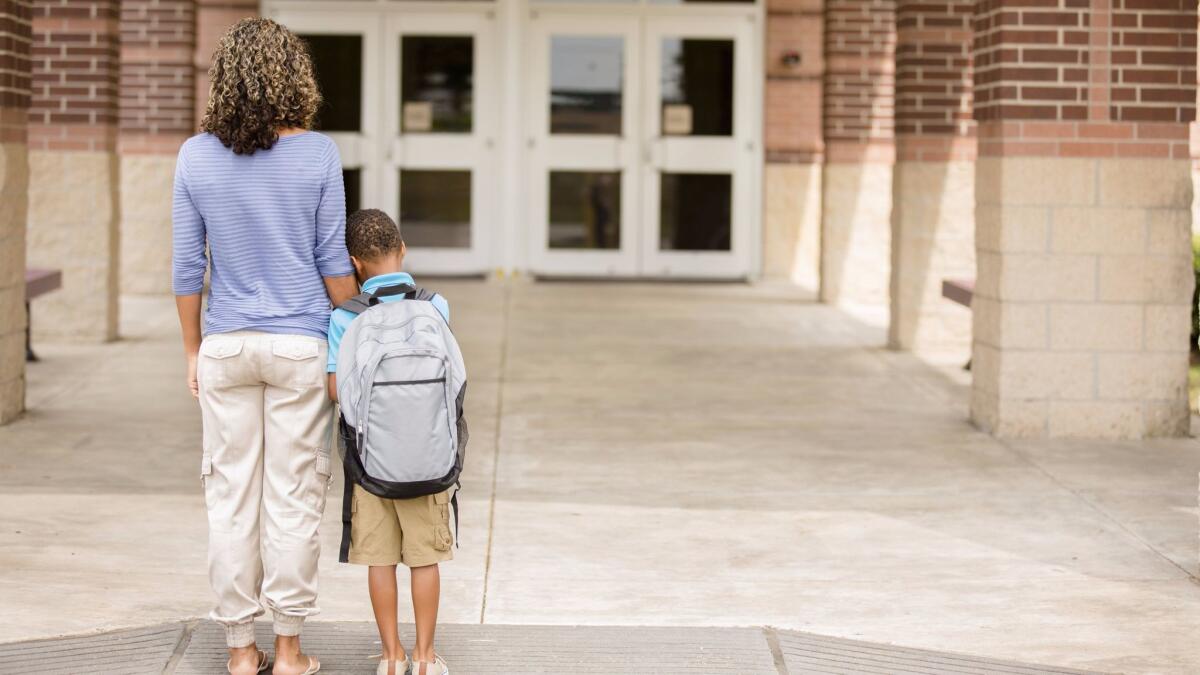Commentary: How parents should react to anxiety in their children may surprise you

- Share via
Anxiety disorders are one of the most common conditions that I see in my patients: children, teens and adults.
But what I find interesting is that many parents don’t know how to determine if their child has an anxiety disorder. Parents typically interpret anxious behaviors as nervousness or stress.
When worry begins to interfere with one’s daily activities, it’s characterized as an anxiety disorder.
Anxiety disorders affect 1 in 8 children, and research has shown that, if left untreated, children are at higher risk to perform poorly in school, miss out on important social experiences and engage in substance abuse.
Some children and adolescents aren’t able to verbally express their anxiety and will often avoid situations they are fearful of and make up excuses to cover up that they are anxious.
Because these individuals repress their feelings, many will often exhibit difficulty concentrating, restlessness in the form of nail biting or picking, excessive body movements and inability to be still (i.e. bouncing their legs), insomnia, even psychosomatic problems (recurring headaches or stomach aches).
Many are often easily overwhelmed and can have big reactions to small situations. We’ve seen cases where it’s been extreme to the point that the teen will experience dizziness and pseudo-seizures caused by anxiety.
For parents, it can be challenging to help a child overcome anxiety.
Helping your child understand their anxiety and what causes it can help them manage it in a healthy way.
Whatever you do, do not nurture anxiety (i.e. “It’s OK. It’s only ...). If you nurture anxiety, it communicates to them that their worry is legitimate. This comes as a shock to many parents when first brought to their attention. You need to have a dramatic response (eye and head roll, “Oh please, give me a break, that’s ridiculous. I’m not even going there with you”) and then switch topics.
This serves to communicate to them that they are making the situation much bigger than it needs to be, and by changing the conversation it helps get them off of their anxious thought.
One tip for managing anxiety is to try breathing techniques. Start by having your child breath in for three seconds, hold for three seconds and blow out for three seconds. Repeat this three times in a row. Because anxiety is derived from thoughts about the future, help your son or daughter to exist in the present by identifying their five senses: what do they see, smell, taste, hear and physically feel right here right now in this moment?
Your children constantly look to you to see if their reactions are appropriate. If you are anxious, your child does not have the sense of stability they need in life and as such, have a high likelihood of becoming anxious themselves.
If you struggle with anxiety as a parent, I encourage you to find a trained CBT (cognitive behavioral therapy) therapist you can work with to learn the skills that will enable you to deal with your anxiety. In doing so, not only will you feel better but you will learn tools to teach your kids if you see them struggling with anxiety as well.
JERRY WEICHMAN is a clinical psychologist and adolescent specialist at Hoag Neurosciences Institute.
All the latest on Orange County from Orange County.
Get our free TimesOC newsletter.
You may occasionally receive promotional content from the Daily Pilot.





